Each week CDG discusses a new theme related to conservation. Here you can find session titles and associated resources.
Starting January 2022: CDG will meet on Tuesdays online from 15:00-16:00. Meeting Link which will work for all meetings. Find the Zoom link here.
Winter 2022
March 29th, 2022: Breaking the Language Barrier in Conservation Science
Led by: Dr. Rassim Khelifa (Postdoctoral Fellow, WoRCSLab, IRES)
To do:
Dr. Rassim Khelifa, a Postdoctoral Fellow in IRES (and one of CDG’s facilitators), will talk to us about breaking language barriers in conservation science – see his poster below.
Rassim is a quantitative ecologist interested in community response to climate change and human impacts, sexual selection, and biodiversity conservation. He is also highly interested in communicating science to the public, engaging the public in scientific research, and improving the academic environment by advocating justice, equity, diversity and inclusion. In fact, Rassim has four very recent publications that address EDI issues in science! We’ve provided the links to those papers below, the first of which will help you prepare for the CDG meeting next week.
- Trends in Ecology and Evolution: https://www.zoology.ubc.ca/conservation/wp-content/uploads/2022/03/Khelifa-et-al.-2021.-TREE.pdf
- Nature Ecology and Evolution: https://www.zoology.ubc.ca/conservation/wp-content/uploads/2022/03/s41559-021-01609-7.pdf
- Ecology Letters: https://www.zoology.ubc.ca/conservation/wp-content/uploads/2022/03/Ecology-Letters-202[…]eded-to-establish-a-global-view-of-equity-diversity-and.pdf
- FACETS: https://www.zoology.ubc.ca/conservation/wp-content/uploads/2022/03/facets-2021-0073.pdf
We will be holding this meeting in hybrid form in BRC 225 and via this zoom link.
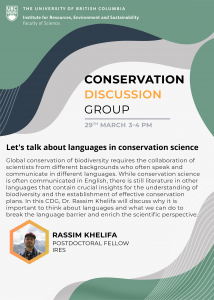
March 15th, 2022: iBioS Faculty Cluster Hire Talk
Led by: Dr. Shermin de Silva (Assistant Professor, Geography/Zoology)
To do:
In this meeting, we’ll get to know Shermin, the conservation practitioner! Shermin will discuss her work in Sri Lanka, differences and balance between NGO priorities vs. academic research, and what she is most excited about in conservation.
We will be holding this meeting in hybrid form in BRC 225 and via this zoom link. The room can hold 15 people only but if we get full please still join in via zoom.
March 1st, 2022: Why measuring conservation impacts causally is powerful for policy making
Led by: Dr. Josephine Gantois (Postdoctoral Fellow, WoRCS, IRES)
To do:
Josephine will help us discuss a very important topic for all of us interested in effective conservation research: why measuring conservation impacts causally is powerful for policy making. We will discuss some of the common approaches to measuring causal impacts, and difficulties that arise when it comes to applying these approaches to the field of conservation science. A couple questions Josephine will ask:
- Do you see a role for causal approaches in your line of work?
- Do you think that those approaches are compatible with the urgency of some conservation issues, and with qualitative approaches to conservation science?
February 15th, 2022: Is science biased by the exclusion of key socio-economic outcomes?
Led by: CDG Facilitators (Angle Brennan, Gaurav Singh-Varma, Rassim Khelifa Jared Grummer)
To do:
We are going to discuss two short papers – one is a commentary on the other – about the human-driven causes and consequences of our current, multi-faceted environmental crises. Is human population growth the primary driver or is this a “western, elitist and neo-colonial bias [that] distracts from holding accountable more powerful forces in society”? This is one of many questions posed that we hope to discuss. We would love all social scientists, economists, conservation biologists and ecologists in general to come respectfully share ideas on how to think about this issue.
- Perspective: https://www.zoology.ubc.ca/conservation/wp-content/uploads/2022/02/Bradshawetal_2021.pdf
- Commentary: https://www.zoology.ubc.ca/conservation/wp-content/uploads/2022/02/Bluwsteinetal_2021_commentary.pdf
February 1st, 2022: Traditional Ecological Knowledge
Led by: CDG Facilitators (Angela Brennan, Gaurav Singh-Varma, Rassim Khelifa)
To do:
The CDG team will facilitate a discussion about a recent model (see paper below) for decolonizing conservation and management, illustrated with Indigenous-led stewardship of grizzly bears in the Great Bear Rainforest of British Columbia. We know many of you, just like us, are interested in learning more about how to recognize and support resurgent Indigenous-led conservation and management, so please come join us to thoughtfully discuss this issue.
- Paper: DecolonialModel_GreatBearRainforest_2022 (and see the reading lists in the Notes section at the end of the paper if you’re interested in learning more)
Fall 2021
December 7th, 2021: Restoration – Ecosystem Engineering
Led by: Drew Bondar (Delta Farmland & Wildlife Trust)
To do:
This week we are welcoming another outside speaker, Drew Bondar, who is also an excellent person to network with, but whose main aim with the CDG will be to help facilitate a discussion on restoration and land stewardship. Drew is the Executive Director of Delta Farmland & Wildlife Trust (DF&WT), a non-profit organization that promotes the annual preservation of over 3,500 acres of farmland and wildlife habitat on the lower Fraser River delta through co-operative land stewardship with local farmers. See this great article about how DF&WT got started https://www.straight.com/news/402996/anne-murray-creation-delta-farmland-and-wildlife-trust
Why should you come talk with Drew? Well, Drew is passionate about food systems — from the biodiversity in soil to the networks we use to distribute food. In his role with DF&WT, he works with farmers to enhance farmland for soil health and wildlife habitat. He is also the founder of a small business that rescues and delivers off-grade produce, so he has a lot of experience working across the food supply chain. He has dual degrees in agroecology and civil engineering, with training in a wide range of disciplines from project management to soil biology. He is very committed to finding socially, environmentally and economically sustainable solutions to climate change and biodiversity loss at the local level.
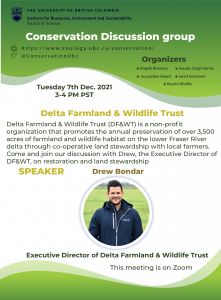
November 30th, 2021: NETWORKING NOVEMBER
Led by: Richard Pither (Research Scientist with Environment and Climate Change Canada)
To do:
The finale of Networking November is happening this week with Richard Pither, Research Scientist with Environment and Climate Change Canada.
We are wrapping up this networking initiative in style, as Richard is a highly connected and experienced scientist and conservation practitioner – just check out his bio below. On top of that, Richard is a fantastic person to collaborate with and seek advice from! Come to this session to get connected, ask him questions and learn about his work across Canada.
Richard’s Bio: “Richard just completed his first year as a Research Scientist in the Wildlife and Landscape Science Directorate of Environment and Climate Change Canada. His research focuses on understanding how best to manage landscapes to support the conservation of biodiversity, with a particular emphasis on ecological connectivity. Previously, Richard worked for the Parks Canada Agency for more than 15 years, where he was involved in developing federal policy and recovery plans for species at risk, active management and restoration planning in parks, and field work in remote areas when he was lucky. Richard studied patterns of tree species diversity in Belize for his Ph.D. and the genetic connectivity of woodland caribou in boreal Canada for his Postdoc.”
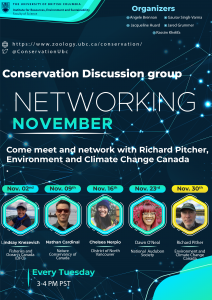
November 23rd, 2021: NETWORKING NOVEMBER
Led by: Dawn O’Neal (Vice President of National Audubon Society and Executive Director of Audubon Delta)
To do:
Networking November continues this week with Dawn O’Neal, Vice President of National Audubon Society and Executive Director of Audubon Delta.
Dawn has an amazing background in academia that she took to the NGO realm, where she’s advanced conservation research and enhanced the impact. She has a ton to offer us, and if you want to make connections in the US, this is a great chance to do that. See her bio and see the poster below for the full lineup of speakers this month.
Dawn’s Bio: “Dawn O’Neal has a dynamic background implementing global projects and 9+ years’ experience leading and steering improvement strategies for non-profit conservation, education, and research organizations. She strives to help organizations engage in meaningful and productive collaborations with communities and stakeholders and to develop equitable and inclusive business practices.
In Dawn’s role with the National Audubon Society, she is building and leading Audubon’s new regional office across Arkansas, Louisiana, and Mississippi. As Executive Director of Audubon Delta, she leads a talented team in advancing regional conservation priorities and delivering durable policy solutions. Dawn also serves as a Vice President of the National Audubon Society working with peers across the country to shape and deliver national objectives, initiatives, and processes.
As the Director of Strategic Initiatives at The Nature Conservancy (TNC), Dawn developed and stewarded several long-term strategies to help TNC scientists build emotional intelligence, enhance technical capacity, and develop skills to enrich collaborations with stakeholders and increase the impact of conservation outcomes.
Before joining TNC, Dawn was Executive Director at the Huyck Preserve leading four critical organizational functions in the areas of Conservation, Education, Research, and Recreation for the 2,000-acre land trust. She stewarded volunteer programs, vibrant science-based nature programs, and a biological research station in addition to fostering partnerships with a regional network of preserves, academic, and governmental agencies to inform natural resource conservation through research.
Dawn holds a BA in environmental studies from Washington University and a PhD in ecology from Indiana University. She has experience directing projects and leading research efforts at national and international levels with research experience in the fields of climate change biology, life history evolution, disease ecology, and eco-physiology.”
If you want to know more about some of the projects Dawn has been involved with throughout her career here are some great links to explore:
- Ecological Monitoring and Management Alliance https://www.emmahv.org/
- Huyck Preserve Stewardship and Management Plan: https://www.huyckpreserve.org/uploads/2/4/5/6/24560510/huyck_stewardship_and_management_plan.pdf
- NatureNet Science Fellowship Program: https://www.nature.org/en-us/about-us/who-we-are/our-science/naturenet-science-fellowships/
- Conservation by Design 2.0: https://www.conservationbydesign.org/
- Science Impact Project which became the Science and Conservation Professional Development Program:
All her amazing work can also be found on her LinkedIn profile: https://www.linkedin.com/in/dawn-m-oneal
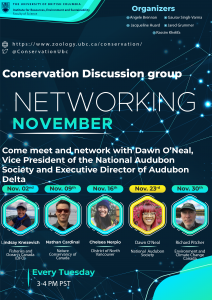
November 16th, 2021: NETWORKING NOVEMBER
Led by: Chelsea Nerpio (Biologist at the District of North Vancouver)
To do:
Networking November continues this week with Chelsea Nerpio, Biologist with the District of North Vancouver.
Chelsea has a variety of on-the-ground experience in the environmental consulting, government and conservation realms. Definitely come join us to learn about her work in these roles! See her bio and see the poster below for the full lineup of speakers this month.
Chelsea’s Bio: “Chelsea is a Registered Biology Technologist who studied Environmental Science at the University of British Columbia. Chelsea has experience in regulatory and enforcement work and she has developed and implemented environmental programs including habitat protection, erosion and sediment control, invasive species management and pollution prevention. Chelsea has field technical experience in tree inspections; environmental monitoring; riparian habitat restoration; bird nesting surveys; and fish, amphibian and small mammal salvages. Chelsea has worked in consulting, conservation, and now works in the municipal environments. She is super excited to share her experiences and advice with the group!”
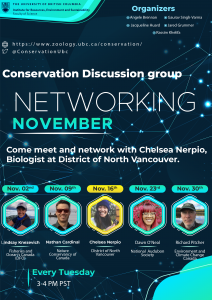
November 9th, 2021: NETWORKING NOVEMBER
Led by: Nathan Cardinal (Senior Advisor on Indigenous Relations with the Nature Conservancy of Canada (NCC))
To do:
Networking November continues this week with Nathan Cardinal, Senior Advisor on Indigenous Relations with the Nature Conservancy of Canada (NCC). Nathan is awesome and really engaging. Definitely come join us, with lots of questions for Nathan, to learn about his incredibly interesting and important work! See his bio and see the poster below for the full lineup of speakers this month.
Nathan’s Bio: “Nathan is a member of the Metis Nation with roots in northern Alberta. Currently he works as the senior advisor on Indigenous Relations with NCC, where he is on secondment from Parks Canada. Nathan has spent the last couple of decades thinking about how individuals and organizations can support Indigenous-led conservation efforts and has had the opportunity to work with and learn from First Nations, Metis, and Inuit people, governments, and organizations from coast to coast whether at community, regional, or national scales. Nathan has experience working with Indigenous communities on conservation projects (such as the clam garden restoration project at Gulf Islands National Park Reserve), undertaking research on species at risk and Indigenous knowledge (such as the development of Aboriginal knowledge reports for the Committee on the Status of Endangered Wildlife in Canada), as well as policy-related conservation work (such as the Indigenous Guardians program for the federal government). Nathan has a bachelor of environmental science from UBC and a master of environmental studies from Dalhousie. He currently calls Salt Spring Island, the traditional territory of the Hul’q’umi’num and W̱SÁNEĆ Nations, in southwestern BC home.”
If you want to know more here is some interesting reading that speaks to the different work Nathan gets involved in:
- Decolonization is not a metaphor – a thought-provoking and challenging article about the co-opting of “decolonization” by settler society. It is quite the perspective.
- Indigenous knowledge and the shackles of wilderness – an interesting read examining the concept of “wilderness” and the impacts on Indigenous peoples and knowledge.
- Parks Canada horizontal scan – Some really interesting findings related to Indigenous rights and conservation in another conservation organization.
- Fixing the SAR – similarly, some interesting pieces related to revamping similar systems.
- 10 calls to action for natural scientists – an informative article about how the scientific community can take action towards better science and reconciliation
- We Rise Together – a foundational report by the Indigenous Circle of Experts that shows how Indigenous-led conservation really is a defining pathway for the future of conservation.
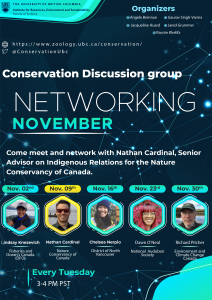
November 2nd, 2021: NETWORKING NOVEMBER
Led by: Lindsay Knezevich (Senior Biologist at Fish and Fish Habitat Protection Program within Fisheries and Oceans Canada)
To do:
We will be kicking off our Networking November with Lindsay Knezevich, Senior Biologist with the Fish and Fish Habitat Protection Program (FFHPP) within Fisheries and Oceans Canada (DFO)! This is an opportunity to learn about the work going on at DFO and to ask Lindsay questions about her position, career path and advice for early career biologists interested in conservation –she’s looking forward to a great discussion and any questions you may have! See her bio and see the poster below for more information
Lindsay’s Bio: “Lindsay has been with DFO since July 2017 after 7.5 years in environmental consulting. She worked in Vancouver at DFO’s Regional Headquarters before transferring to Whitehorse at the end of 2019. She has reviewed and monitored a wide variety of projects throughout the Pacific region and is currently working to establish improved communications and relationships with proponents, consultants, First Nations and other federal bodies that work in the Yukon as they relate to projects that have the potential to impact fish and fish habitat.”
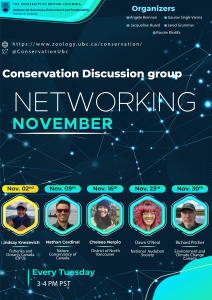
October 26th, 2021: The Effects of COVID-19 on Conservation
Led by: Dr. Robin Naidoo (Lead Scientist at WWF-US)
To do:
Dr. Naidoo recently wrote about the implications of covid-19 on sustainable development and conservation in Nature, and also evaluated the impact of the pandemic on wildlife consumption in southeast Asia. Tuesday’s meeting is an opportunity to meet Robin and discuss global conservation during/after covid. The following reading materials are suggested to help guide the discussion:
- Implications of COVID-19 on Social Development
- Impact of COVID-19 on Wildlife Consumption in southeast Asia
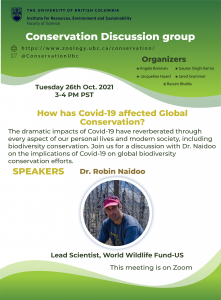
October 12th, 2021: The Effects and Potential Implications of Marine Heat Waves on Biodiversity and Conservation
Led by: Fiona Beaty (PhD Candidate, Harley Lab, Zoology); Sandra Emry (PhD Candidate, Harley Lab, Zoology); Graham Brownlee (Master’s Candidate, Harley Lab, Zoology)
To do:
Three experts – Fiona Beaty, Sandra Emry and Graham Brownlee – from UBC will discuss “The effects and potential implications of marine heat waves on biodiversity and conservation”. See their poster below. They’ve suggested reading the following paper and news article to help guide the discussion.
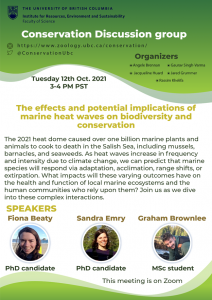
September 28th, 2021: Creative Conservation Outreach (Zoom only)
Led by: Rassim Khelifa (Postdoctoral Fellow, WoRCS Lab, IRES)
To do:
Our speaker, Dr. Rassim Khelifa, will lead a discussion on “Using Games and for Environmental Education and Public Outreach”! See his poster below – gamers out there, you’ll want to check this out. For all of us, this will be a fun and creative discussion on how to inspire and educate people about conservation!
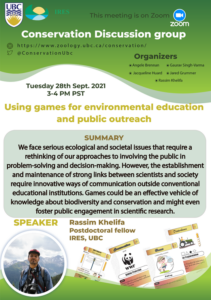
September 13, 2021: CDG Welcome Meeting (Zoom only)
Led by: CDG Facilitators (Angela Brennan, Gaurav Singh-Varma, Jacqueline Huard, Rassim Khelifa)
To do:
It’s time to start another year of inspiring discussions about conservation, and we’re super excited! Not only because campus is coming alive again and we’re going to broaden our exposure to conservation ideas, issues and practices, but because we have joined forces with two amazing new facilitators: Jacqueline Huard and Rassim Khelifa!
We have a few ideas for the year (with more cropping up every day), including a month focused on networking, bringing in researchers outside UBC, and discussions about the effects of current events (particularly COVID-19 and its impacts) on conservation. But we also want to hear from you. What do you want to discuss? Come join us next week in our welcome session to help shape our themes!
Winter 2021
April 27th, 2021: Happy Hour CDG
Led by: CDG Facilitators and Conservation Science Initiative Coordinators
To do:
We will be reflecting on the past year and discussing conservation topics for future meetings.
April 20th, 2021: Linkages Between Ecosystem Services and Human Health Goals with Soil Science
Led by: Jordy Kersey (PhD Student, LFS, Sean Smukler’s Lab)
To do:
Jordy would like us to read this paper by Keith et al. (2015) and think about the following questions:
- What are some key synergies between ecosystem services and human health? Think beyond only soil science.
- How can initiatives that target these synergies facilitate future research?
- How do we craft our research goals to encompass conservation, human health goals and societal issues?
Jordy hopes to expand the conversation into other areas where ecosystem services can be connected to human health goals (or societal goals), so please join if you have ideas or expertise to help us think about this topic.
April 6th, 2021: Implications of Human-Wildlife Conflict in Conservation
Led by: Alys Granados (Post Doc, Forestry, Cole Burton’s Lab)
To do:
Alys would like us to read this paper by König et al. and think about the following questions raised by the authors:
- Why is integrated research needed to understand and overcome the challenges of human-wildlife conflict?
- Which methodological and biological considerations determine the effectiveness of mitigation measures?
- Which dimensions, instruments, and levels of governance determine the outcome of human-wildlife conflict and coexistence?
The paper is a summary of a special section in Conservation Biology, so there are lots of references for further reading. A great example is a paper by Treves et al. that digs into the myths and assumptions about human-wildlife conflict and coexistence.
March 23rd, 2021: Changing Human Perspective on Conservation
Led by: Harold Eyster (PhD student, IRES, Chan Lab)
To do:
As the name of the world’s preeminent conservation society (Society for Conservation BIology) makes clear, conservation has historically focused explicitly on biology. However, there’s increasingly recognition that to advance conservation, we must also understand and change human attitudes and behavior. However, is this focus on individual attitudes and behaviors appropriate for bringing about the transformative change that today’s biodiversity crisis requires?
This week’s paper by Elizabeth Shove presents a fictional conversation between a policymaker and a social scientist who suggests thinking about sustainability in terms of ‘practices’, instead of individual behaviors, is essential for advancing sustainability. The paper is meant to be approachable, so you should get something out of it even if you’re not used to reading social science papers.
A few questions to think about as your read this paper:
First think about your study system, or some environment that you care about.
- What attitudes/behavior changes might help to conserve it?
- Now instead focusing on ‘practice’ change: what practices might help conserve it?
I’ll also share some examples and draw on some of my own work examining how to change environmental action.
March 9th, 2021: Microbial Conservation
Led by: Chelsea Gowton (PhD student, LFS)
To do:
- Read Trevelline et al.’s 2019 paper “Conservation biology needs a microbial renaissance: a call for the consideration of host-associated microbiota in wildlife management practices“
- Think about the ways in which considering microbes in a system may have added to the success or failures of the intended conservation outcomes.
February 23, 2021: Plastic Pollution and Conservation – A Focus on Understanding the Diversity of Plastic Pollution and its Ecological Effects
Led by: Natasha Klasios (MSc student at the Tseng lab, Zoology)
To do:
In this discussion, we will discuss how plastics are a complex suite of contaminants, how this relates to the effects of plastics on organisms and the environment, and discuss current conservation actions.
Here are a few suggested readings (no need to read if you’re busy, I will summarize the main points in my presentation):
The diversity of plastic pollution
Running list of conservation actions:
https://www.nationalgeographic.com/environment/2018/07/ocean-plastic-pollution-solutions/#close
Some discussion questions to consider:
1. Is there a one-size fits all solution to plastic pollution? What types of plastic pollution are targeted by current actions? Are there aspects that are neglected?
2. Does the diversity and complex effects of plastic change the way you think about these conservation actions? How can these factors be used to better inform conservation?
3. Given the field of plastic pollution is relatively young (compared to other fields) and published studies on plastic are growing exponentially, how can researchers make sure their research is applicable to conservation?
4. Why does plastic pollution receive so much attention compared to other threats?
February 9, 2021: Issues of Human Rights in Conservation
Led by: Madison Stevens (PhD student in IRES)
To do:
We’ll discuss the intersection between conservation and human rights, focusing on the potential and demonstrated synergies between recognizing the stewardship rights of Indigenous Peoples and Local Communities, and achieving better ecological outcomes. We’ll also consider the persistence of tradeoffs between human rights and conservation goals, and discuss how conservation actors might ethically navigate these spaces. I will share some brief reflections on my own theoretical and empirical research, and then dive into a discussion on the following topics:
- How might conservation actors move towards a rights-based approach?
- What barriers to reconciling human rights and conservation goals –– institutional, sociocultural, ecological –– persist?
- Are human rights a useful tool, or just rhetoric?
For those of you who are interested, I recommend for context reading the following article by the UN Special Rapporteur on the Rights of Indigenous Peoples (Victoria Tauli Corpuz):
Tauli-Corpuz, V., Alcorn, J., Molnar, A., Healy, C., & Barrow, E. (2020). Cornered by PAs: Adopting rights-based approaches to enable cost-effective conservation and climate action. World Development, 130, 104923.
No need to read if you’re too busy! This will not be a paper discussion but the article can provide a useful jumping off point.
February 2, 2021: Cultural Gaps Between Academic and Industry/Government
Led by: Victoria Hemming (Postdoc in Tara Martin’s lab); Sierra Sullivan (PhD student in Rick Taylor’s Lab); Jacqueline Huard (MSc student in Tara Martin’s lab)
To do:
Victoria, Sierra and Jac will help us discuss how cultural gaps between academia and industry/government can affect how we put science into practice. They’ll share some of their own experiences, but we’ll also want to hear from you to answer the follow questions:
- How does the cultural divide manifest?
- How do we create better networks to facilitate dialog and opportunities for accessing information across sectors?
January 19, 2021: Connecting with Nature
Led by: Jared Grummer
To do:
Jared will lead a discussion focusing on the various ways that humans connect with nature. To prepare:
- Please read this short paper “One Earth – Connecting with Nature”
- Be prepared to share some ideas from the paper that resonated with you as we will go around the Zoom room and ask/discuss everyone’s motivations for conservation and how they personally connect with nature.
FALL 2020
November 12, 2020: Genetic rescue and the conservation of isolated populations
Led by: Jared Grummer
To do:
Read this paper “Genetic Rescue to the Rescue” by Whiteley et al. And if you have time, read this short popular press article from The Atlantic on “genetic rescue” in wolves on Michigan’s Isle Royale.
Think about the following questions prior to discussion:
- Do you know of any examples of assisted migration or genetic rescue attempts?
- What ethical and biological issues do you see with genetic rescue?
- What are some alternatives to genetic rescue for maintaining population connectivity? How feasible are the various approaches?
November 5, 2020: How can ecological connectivity inform conservation planning
Led by: Gaurav Singh-Varma and Angela Brennan
To do:
Read this paper “Incorporating connectivity into conservation planning for optimal representation of multiple species and ecosystem services” by Williams et al. Think about the following questions prior to discussion:
- How is connectivity considered, evaluated, conserved in your systems?
- How do we conserve connectivity effectively when many species don’t move through discrete corridors?
- How do we maintain/balance area-based conservation targets, connectivity and human food production?
October 29, 2020: Connecting ecological theory & conservation
Led by: Jacob Usinowicz
To do:
Read this paper “Links between community ecology theory and ecological restoration are on the rise” by Wainwright et al., and or an accompanying blog post by Claire Wainwright. Think about the following questions:
- Would you consider your work basic (developing or directly testing theory), applied, or directly conservation driven?
- If your work is more basic or applied, can you identify a major conservation challenge that your work relates to?
- If your work is more applied or directly conservation driven, can you identify major ecological theories that inform your approach?
- Do you feel that ecological theory is informed by conservation issues?
- Do you feel that conservation needs to incorporate more ecological theory?
October 22, 2020: Reconciliation for biologists in Canada
Led by: Fiona Beaty
To do:
Read “Towards reconciliation: 10 Calls to Action to natural scientists working in Canada” by Wong et al.
October 15th, 2020: Continuation of discussion regarding conservation in the BRC
October 8th, 2020: BRC Conservation Spotlight
October 1, 2020: Adaptive management to alter conservation outcomes
Led by: Melanie Dickie
To do:
Read: Walters and Holling’s “Large-Scale Management Experiments and Learning by Doing“.
Brainstorm some examples of where you have seen adaptive management work or not (and why), and/or examples where you think it could have been useful.
September 24, 2020: Anti-racism in Ocean Sciences
Led by: Sara Cannon
To do:
Take Harvard’s Implicit Bias Test
Check out A Timeline of Events That Led to the 2020 ‘Fed Up’-rising
Look at and answer questions in a worksheet that can help you identify biases and centre social justice in your research
September 17, 2020: Conservation Across Scales
Led by: Kaleigh Davis
Readings:
Linking the influence and dependence of people on biodiversity across scales
WINTER 2020
March 10, 2020: Subsidizing extinction
Led by: Jessica Dempsey
Readings:
Dempsey et al. 2020 – Subsidizing extinction?
February 25, 2020: The value of research to decision
Led by: Victoria Hemming and Abbey Camaclang
Readings:
Acting fast helps avoid extinction
Allocating monitoring effort in the face of unknown unknowns
The conservation return on investment from ecological monitoring
February 18, 2020: Evidence for Democracy
Led by: Kimberly Girling
Readings:
Report on how Canadian MPs find and assimilate science into their work
Evidence for Democracy website
February 4, 2020: Privilege in Conservation Science
Led by: Amy Liu
Readings:
Brown et al 2016: Facilitating discussions about privilege among future conservation practitioners
Salomon et al 2018: Democratizing conservation science and practice
January 28, 2020: Identifying solutions for overcoming bias in expert and guest speaker selection in biodiversity research
Led by: Victoria Hemming
Reading:
- One page article: Baum and Martin found incredible bias in a list published in nature of the 100 must read articles in ecology
- One page article: An issue of confidence
January 14, 2020: Conservation science to management action
Led by: CDG organizers
Reading:
Aylesworth et al., 2019: Realities of offering advice to governments on CITES
FALL 2019
December 5, 2019: Microbial diversity and conservation
Led by: Chelsea Gowton
Reading:
Shade 2017: Diversity is the question, not the answer
November 21, 2019: Animal welfare and ethics in conservation
Led by: Carla Di Filippo
Readings:
Walker et al. 2012: A review of the effects of different marking and tagging techniques on marine mammals
November 14, 2019: Land sharing and/or land sparing?
Led by: Chelsea Little
Readings:
Sparing vs Sharing: The Great Debate Over How to Protect Nature
Grass et al 2019, People And Nature
Optional:
Loconto et al 2019, Land Use Policy
Kremen & Merenlender 2018, Science
November 7, 2019: Nature’s contributions to people, ecosystem services, and the big rift
Led by: Kai Chan
Readings:
Díaz et al. 2018 – Assessing nature’s contributions to people
Nature News feature: Masood 2018 – The battle for the soul of biodiversity
Various responses and rebuttal to Díaz et al. 2018
Post at the CHANS lab: Ecosystem Services and NCP: There’s Room for Both in a Bigger Tent
October 31, 2019: Indigenous relationality, ways of knowing, and decolonization
Led by: Sara Cannon
Readings:
Whyte 2016 – Our Ancestors’ Dystopia Now: Indigenous conservation and the Anthropocene
October 24, 2019: Biodiversity Legislation in BC
Led by: Sally Otto
Readings:
Protecting Biodiversity in British Columbia
October 17, 2019: Private Land Ownership & Conservation
Led by: Carla Di Filippo
Readings:
Opportunities and Challenges to Implementing Bird Conservation on Private Lands
October 10, 2019: Capitalism & Neoliberalism in Conservation
Led by: CDG Organizers
Readings:
Sleeping with the enemy? Biodiversity conservation, corporations and the green economy
Introduction to the book The New Frontiers of Environmental Conservation (distributed via email)
October 3, 2019: Decolonizing Conservation Research
Led by: Sara Cannon
Readings:
White Allies, Let’s Be Honest About Decolonization
Decolonize your Conservation Conversations
Decolonizing Conservation: A Reading List
The Story We’ve Been Told About America’s National Parks Is Incomplete
Decolonization is not a metaphor
A spatial overview of the global importance of Indigenous lands for conservation
September 26, 2019: Climate change and the public perception of science
Led by: CDG Organizers
Readings:
Canadians’ trust in science falling, poll suggests (CBC news link)
Scientists as Storytellers Guide (pdf)
Closing the Knowledge-Action Gap in Climate Change (pdf)
WINTER 2019
March 21, 2019: Big Cat Worship and Conservation in India
Led by: Keerthikrutha Seetharam
Readings:
1) Monsters or God? Narratives on large cat worship in western India by Vidya Athreya et al. 2018
2) ‘Tigers are Our Brothers’ Understanding Human-Nature Relations in the Mishmi Hills Northest India by Ambika Aiyadurai 2016
March 14, 2019: Traditional Ecological Knowledge
Led by: Jared Grummer
Readings for Thursday’s group:
1. If your birthday is Jan-June read: What Tradition Teaches (Schmidt and Stricker 2010)
2. If your birthday is July-Dec read: Łeghágots’enetę (learning together) by Jean Polfus et al 2016
Other background resources:
Work by Cash Ahenakew (UBC Plains Cree Professor): Grafting Indigenous Ways of Knowing Onto Non-Indigenous Ways of Being The (Underestimated) Challenges of a Decolonial Imagination
United Nations Declaration on the Rights of Indigenous Peoples
Traditional environmental knowledge and western science: in search of common ground
Indigenous knowledge, ecology, and evolutionary biology (book, 282 pages)
February 28, 2019: Metabolic Rift Theory and Abundant Futures (Environmental Sociology–Capitalism, Socialism, and Environmentalism)
Led by: Evan Morien and Sara Nelson
Readings:
1. Clark and York 2005–Global Capitalism and Metabolic Rift Theory
2. The Tragedy of Liberal Environmentalism
Optional Goodies:
A Manifesto for Abundant Futures
February 14, 2019: Biodiversity, Ecosystem Services, and the Land Sharing Debate
Led by: Ira Sutherland and Laura Rasmussen
Resources:
1. Article on the land sparing vs. sharing debate (general audience)
February 7, 2019: The Species at Risk Act (SARA) and the role of the COSEWIC advisory committee in advising the government on recognizing endangered species
Led by: Jeannette Whitton
Resources:
1. Meagre targets and modest progress for endangered species recovery in Canada
January 31st, 2019: Biodiversity and Ecosystem Services
Led by: Matt Whalen
Key Questions:
What is biodiversity? Why is it relevant to you/society?
-
-
How many species are there in your backyard?
-
How do we protect the species that probably exist but have not yet been discovered?
-
What services might they provide?
-
How are the Half-Earth project and other large-scale conservation initiatives helpful or not helpful?
-
January 24th, 2019: Economics and conservation
Led by: Sumeet Gulati and Frederik Noack
- Podcast: http://freakonomics.com/podcast/the-cobra-effect-a-new-freakonomics-radio-podcast/
- Paper: Metrick and Weitzman 1998, Conflicts and choices in biodiversity preservation
January 17th, 2019: Values, trade-offs, politics and markets
Led by: Hugh Scorah
- Video: https://youtu.be/JYa_wEw79FE
- Video: https://youtu.be/quPXIrUxCy4
Meeting Notes:
When something is “sacred” you are willing to give up more for it
Economics with differing value systems makes it hard to coordinate activities
How do we internalize externalities in a market system? – As a solution we put a price on it! With different systems to achieve that price
But do markets belong in these systems?
Other ways to go about these systems include policy movements and grassroots organizations making adjustments
How to negotiate conservation trade-offs – exercise in beginning coordination efforts in conserving a species
- Identify the stakeholders
- What does the science say to protect x?
- Who owns the rights?
- What are the mechanisms available for managing management and what is the best way to ensure everyone receives the most benefits?
January 10, 2019: The roles we play in conservation
Led by: Fiona Beaty, Sarah Joy Bittick, Kaleigh Davis, Chelsea Gowton
We will be discussing the fundamentals of conservation. What is it? Who is it for? What roles do scientists, social scientists, politicians play and what does the intersection between these professions look like? Where does advocacy fit in?
Meeting Notes:
Opportunity for stem outreach events with Open Science Network Specifically Recruiting for Innovation Week
Anvil Centre in New Westminister, March 2-3
There are four two-hour sessions throughout March 2-3
Looking for scientists to run an outreach booth related to their area of study.
Contact wes@opensciencenet.org
Discussion:
The roles of the Academic, Advocate, Broker
Are they separate and mutually exclusive? Do roles blend together?
Positive or negative feedback loop between the roles of academic and advocate – terms aren’t mutually exclusive but can piggy back off of each other to our advantage or disadvantage.
The broker – Can you be an academic and a broker? Are they a third party?
Separate hats and identities depending on conversation
The perception of applied science people being removed seems detrimental as there are motivations for us to continue to conduct research
“Pretending you don’t have biases is worse than throwing them all out on the table”
How does the public perceive how science influences policy?
The process is much bigger than us as individual scientists that overall our biases should be self-correcting – does this happen or do we just have pockets of individual biases?
Ways of gaining knowledge all have some measure of “wrong” but the scientific method is consistent enough that the public has a general acceptance of its practice.
Science is aware of the limitations of our data
Our perception is that the public expects science to be the end all answer
Do nonscientists ever see the future directions after our science has been “communicated”? who’s responsibility is this?
You know what you do, and you know what your neighbor does but the public doesn’t exactly know what you do because they don’t interact with you.
FALL 2018
December 13, 2018: Discussion on goals for next term
Led by: Fiona Beaty, Sarah Joy Bittick, Chelsea Gowton
December 6, 2018: Conservation genetics and genomics
Led by: Jared Grummer and Pirmin Nietlisbach
- Shafer et al. 2015, Genomics and the challenging translation into conservation practice
-
Garner et al. 2016, Genomics in Conservation: Case Studies and Bridging the Gap between Data and Application (Comment on Shafer et al. 2015)
November 29th, 2018: Conservation triage and decision making
Led by: Mairin Deith
- Cornwall 2018, Should it be saved?
-
Park 2018, Ethics and politics of conservation triage (Rebuttal to Cornwall 2018)
November 22nd, 2018: Working land conservation: farms, forest and conservation.
Led by: Chelsea Gowton
- Kremen and Merenlender 2018, Landscapes that work for biodiversity and people
November 15th, 2018: The intersection of Indigenous knowledge and academic science
Led by: Zander Chila and Kaleigh Davis
- Ban et al. 2018, Incorporate Indigenous perspectives for impactful research and effective management
November 8th, 2018: Optimizing the conservation of migratory species, with a particular focus on neotropical birds
Led by: Dr. Peter Arcese
November 1st, 2018: How do we define success in conservation/restoration outcomes?
Led by: Stefanie Lane
- Palmer et al. 2005, Standards for ecologically successful river restoration
- Jansson et al. 2005, Stating mechanisms and refining criteria for ecologically successful river restoration: a comment on Palmer et al. 2005
- Knight et al. 2008, Knowing but not doing: selecting priority conservation areas and the research-implementation gap
- Hiers et al. 2012, The dynamic reference concept: measuring restoration success in a rapidly changing no-analogue future
- Palmer and Hondula 2014, Restoration as mitigation: analysis of stream mitigation for coal mining impacts in Southern Appalachia
October 25th, 2018: How well does research achieve its desired outcomes: a look into the scientific processes, methods, and responsibilities that underscore conservation research.
Led by: Fiona Beaty and Emily Adamczyk
- Sarewitz 2004, How science makes environmental controversies worse
- Pielke 2007, The Honest Broker: Making sense of science in policy and politics – Chapter 1: Four idealized roles of science in policy and politics
- Lovbrand and Oberg 2005, Comment on ‘‘How science makes environmental controversies worse’’ and ‘‘When Scientists politicise science: making sense of the controversy over The Skeptical Environmentalist’
October 18th, 2018: Tradeoffs arise when conservation action is implemented: how are these tradeoffs documented and compared through qualitative and quantitative means?
Led by: Mairin Deith and Madison Stevens
- Williams et al. 2010, Deciding What to Save: Trade-offs in Conservation
October 11th, 2018: Understanding the human dimensions of conservation
Led by: Dr. Nathan Bennett
- Bennett et al. 2016, Conservation social science: understanding and integrating human dimensions to improve conservation
October 4th, 2018: Food security, food sovereignty and conservation
Led by: Rachel Mazac and Chelsea Gowton
- Rizvi et al. 2018, Global land use implications of dietary trends
- Quirks and Quarks: We can’t grow enough food to feed the world according to the Food Guide
September 27th, 2018: Marine protected areas: planning, process, and implementation
Led by: Rober de Wreede
